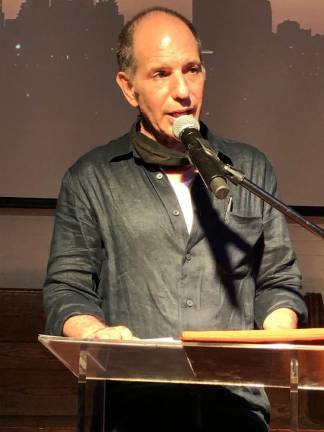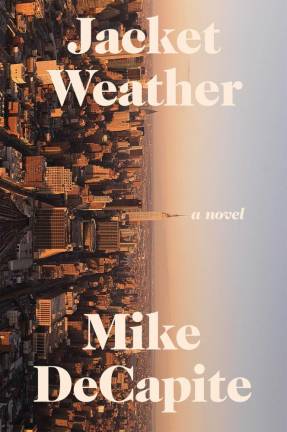A Lover in the City
Mike DeCapite’s New York novel about a rekindled romance


He wouldn’t say it, shy and mellow as he is, but Mike DeCapite has written the New York novel of the moment.
A love story of middle-agers who feel time slipping and so rush into each other, “Jacket Weather” (Soft Skull Press, 2021) chronicles the rekindled romance between Mike and June upon meeting one day after having not seen each other since the 1980s downtown Manhattan music scene. Although they’ve aged and endured their respective divorces, they feel the zest and anxiety that marks first love. They kiss and jab, caress and shout, and through it all, they resolve. They’re the most lasting kind of couple: they put up with each other, get each other out of bed.
The book, which DeCapite began almost a decade ago, has drawn praise from such luminaries as Sonic Youth guitarist Lee Ranaldo, and “First Cow” filmmaker Kelly Reichardt. New York literary stalwart Luc Sante even commented in a review, “You can’t stop reading it.” Like the most affecting novels, however, “Jacket Weather” truly succeeds because its characters feel like living, breathing people, their joys and humiliations unfolding in real time.
DeCapite, a Cleveland native who started his craft as an adolescent, is a workaday writer who’s maintained an underground following since beginning work on his first novel, “Through the Windshield,” in 1985, when he was 23. Variously described as a seedier version of “On the Road” and something of a masterpiece by fellow Ohioan and “American Splendor” creator Harvey Pekar, the debut relates DeCapite’s experiences as a young taxi driver and portends his keenness for the streets.
“Standing on the corner, ringing my bell,” begins “Jacket Weather” and, immediately, the novelist presents his dizzying 14th Street. From there, his fictionalized self spots June, meets the guys at the Y and rides the subway, hopping everywhere from West Village jazz club, 55 Bar, to Queens Italian restaurant, Parkside. DeCapite is, in fact, a master at setting the scene.
“The approach is more poetic than what you usually get in a novel,” he says over coffee at Elephant & Castle, which is also featured in his book. “I’m more interested in showing you what’s there than in telling you what happened.” Like a play, “Jacket Weather” sheds exposition in preference for immediacy and shows DeCapite as a dramatist of the potentially fateful moments that make up a day.
He concedes that his book isn’t quite plot-focused since there’s not really “any suspense” as to whether or not his two main characters, Mike and June, end up together but the turns in their relationship are his narrative’s through-line. As in life, one minute the lover is right there across the table while, in the next one, there’s just an empty chair. The author has done no less than convey modern romance, in all of its messiness.
At nearly sixty, DeCapite is still a romantic but a realist, too. As his book’s title indicates, he feels the cold and the chill of his mortality but, in writing the novel, he has confronted it up close.
“I don’t know if cathartic is the word for me,” he says of the writing. “It’s like ... It’s your only weapon against death, to be able to write, take a picture or capture something. I feel like if I write a good line or if I get something right and then, y’know, the fact that the book is published is a big deal for me ... It’s like, ‘Score one for Mike’ against death. That’s kind of the feeling, of like, ‘Okay, I’ve got that. I’ve got that.’ ... It’s not catharsis but it’s consolation.”
“Jacket Weather” itself is comforting. Comprising such locker room jokers as Lou and Philly, as well as sentences that read like rock lyrics and jazz notes, it’s a book that can be revisited, that can be played repeatedly.
There is, in fact, a deep musicality to the book. “We get an hour and a half before work. All the time in the world. We ride the 1 to Columbus Circle. Walk to a diner. She gets oatmeal and I get eggs. Settle up, I walk her back to One Time Warner, and our time is up,” reads one passage from the novel and it’s as if Lou Reed still sings and is waiting on some action.
“Music is what I aspire to,” DeCapite confesses and, as salsa also dances across his book’s pages, he employs the rhythms of music to do something more: affirm the power of love. Like a pop song, love is fleeting, he knows, and so it is necessary to hold. “Every moment’s a little bit later,” the Chicago rock group, Wilco, sing and, with “Jacket Weather,” DeCapite seeks to catch the moments of romance that keep flying away.
The book has been out only for about five months but, sitting on the table at such Soho bookstores as McNally Jackson, it is set to endure as the rejuvenating love story that the city needs.
Finishing his coffee, donning his coat, DeCapite heads out to 14th Street.